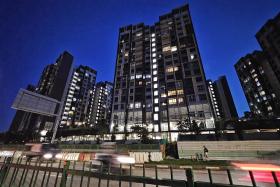Stricter requirements for electricity retailers to protect consumers
Consumers have better protection against volatile electricity prices, with stricter requirements for retailers coming into force on Monday.
Under the new rules, electricity retailers must have minimum paid up capital of at least $1 million when they apply for or renew their license, to ensure that they are credible and have sufficient financial standing, said the Energy Market Authority. Retailers will also need EMA’s approval in appointing key positions, such as its chief executive officer.
This comes as six electricity retailers were forced to exit the market in 2021, while two others terminated contracts prematurely, leaving some customers scrambling to find other suppliers.
EMA said that the enhanced regulatory framework was one of the guardrails to strengthen the competitive market structure.
With the nationwide rollout of the Open Electricity Market in 2018, all consumers including households and small businesses could opt to buy electricity from retailers. However, the onset of the global energy crunch at end-2021 resulted in high, volatile wholesale electricity prices in the Singapore Wholesale Electricity Market, which spilled over to the electricity retail market, it said.
Noting that the early termination forced some consumers to buy electricity at higher rates, EMA said it will also make retailers compensate consumers if they do so. Retailers will not be allowed to unilaterally terminate the contract as long as there is no payment or contractual default by the consumer.
The new requirements were announced by EMA in a paper on Monday, after a public consultation.
The eight retailers in question supplied to around 9 per cent of all electricity consumers, and some affected consumers were transferred to SP Group, noted EMA.
Currently, about 40 per cent of households here have plans from 10 existing private retailers.
This will ensure that the electricity retailers are “financially robust” with strong governance and risk management - to not only tide through occasional volatile periods in the electricity market but also maintain confidence in the sector, said Mr Sharad Somani, who is head of professional services firm KPMG’s ESG (environmental, social and corporate governance) arm.
The existing retailers – Geneco, Keppel Electric, PacificLight Energy, Sembcorp Power, Senoko Energy, Sunseap Energy, Tuas Power Supply, Diamond Electric, Union Power and Flo Energy will also have to hedge at least 80 per cent of their retail contract position - up from 50 per cent previously - and provide a performance bond for the remaining unhedged quantity, to increase resilience against market volatility.
Dr David Broadstock, a senior research fellow from the Energy Research Institute, said that with a more comprehensive hedge coverage, volatile prices on the wholesale electricity market will have a smaller influence over the final electricity price. This will ensure better business planning, with higher price certainty that should benefit both the retailer and their customers.
With the growth of energy intensive sectors like food and transport, as well as advanced manufacturing, power needs will go up by 2028, EMA said.
It is looking to increase its electricity capacity with a new generation plant to be up and running by then.
The facility will have a capacity of at least 600 megawatts - enough to power about 864,000 four-room flats in a year - and will be ready by end-2027.
The agency noted that system peak demand - which refers to the time of day with highest electricity consumption - is expected to reach between 9.3 gigawatt to 11.6 gigawatt by 2028. A new system peak demand of 7.8 gigawatts was reached in May this year amid record-high temperatures.
Said Mr Somani: “The key benefit to the sector is getting security of supply in a more sustainable and affordable manner.
“Singapore must work to ensure availability, reliability and competitiveness of the power made available to drive the economic engine as well as meet the demand of consumers.”
Get The New Paper on your phone with the free TNP app. Download from the Apple App Store or Google Play Store now


